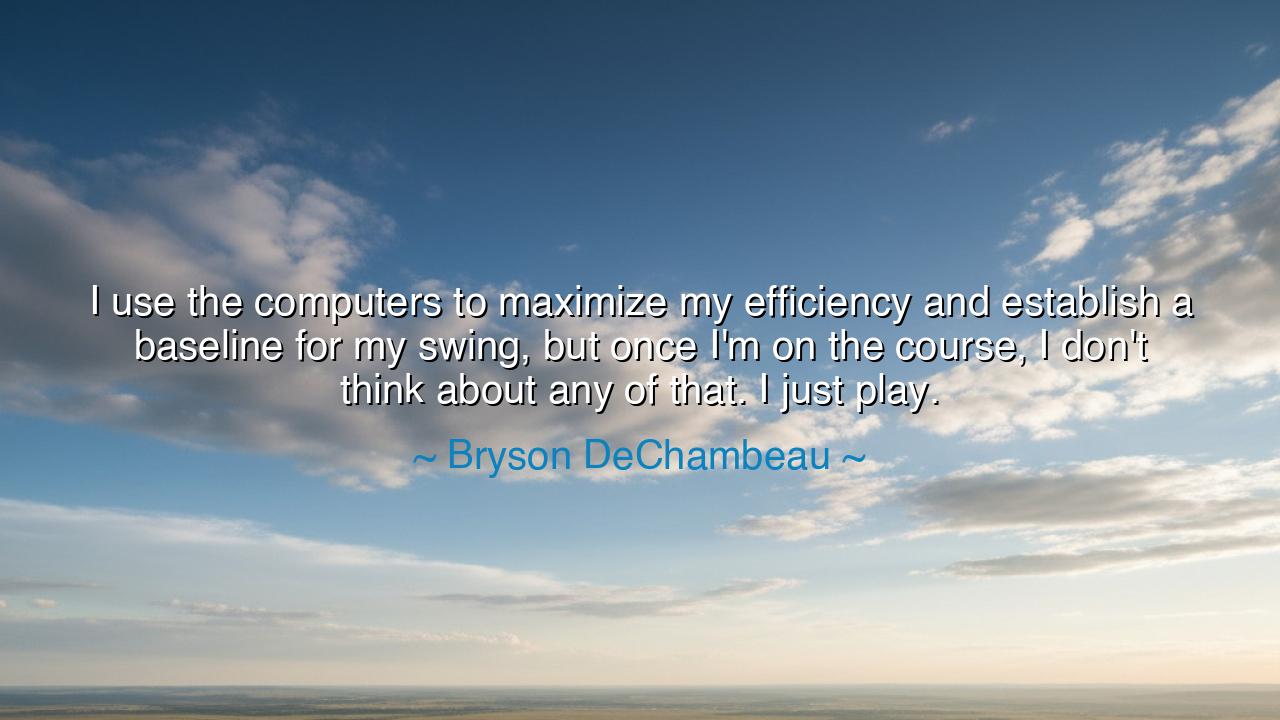
I use the computers to maximize my efficiency and establish a
I use the computers to maximize my efficiency and establish a baseline for my swing, but once I'm on the course, I don't think about any of that. I just play.






When Bryson DeChambeau said, “I use the computers to maximize my efficiency and establish a baseline for my swing, but once I'm on the course, I don't think about any of that. I just play,” he revealed a truth far greater than golf — a truth about the eternal dance between knowledge and instinct, between science and spirit. His words speak of balance, of how mastery is born not from cold precision alone, nor from wild feeling, but from the harmony between both. DeChambeau, a man famed for his analytical mind and his use of data, reminds us that the highest form of understanding is not calculation — it is freedom through preparation.
In the ancient world, warriors trained for years to master their weapons before battle, but once the clash began, they ceased to think — they acted. Their minds became clear as mirrors, their movements born of discipline refined into reflex. What DeChambeau expresses is the same principle: the art of transforming intellect into intuition. The computer, the analysis, the data — these are the stones upon which the foundation of excellence is laid. But once the moment of truth arrives, the spirit must take command. For the heart, not the equation, wins the battle of life.
DeChambeau’s journey in golf mirrors the evolution of modern mastery. He is known as “the Scientist,” using technology to study every angle, every speed, every force that moves the ball. His clubs are uniquely designed, his swing analyzed to perfection by sensors and software. Yet even he — the man of numbers — confesses that there comes a moment when calculation must yield to flow. On the course, under the sky, facing wind and uncertainty, he no longer thinks of launch angles or swing metrics. He lets go. And in that letting go, he becomes what every artist, every athlete, every soul must become: present.
This wisdom echoes through history. Consider Miyamoto Musashi, the legendary Japanese swordsman, who wrote in The Book of Five Rings: “The spirit of the thing itself is in the doing.” Musashi trained endlessly in technique, but in battle, he relied on no fixed thought — he moved as the water moves, free and unthinking. Or recall Leonardo da Vinci, who blended the precision of science with the wonder of art; for him, measurement was not a cage but a doorway into creation. In every age, those who transcend their craft first master its rules, then forget them — not in ignorance, but in liberation.
The meaning of DeChambeau’s words is that preparation must give birth to trust. The mind gathers knowledge; the body remembers it. But when the hour of performance arrives, excessive thinking becomes a chain. True mastery demands surrender — not to chance, but to one’s own cultivated instincts. The computer may guide the hand in practice, but the soul must guide it in play. The wise do not discard knowledge; they absorb it so completely that it becomes part of their nature, no longer requiring conscious thought.
This lesson extends beyond the fairway. In every craft — writing, teaching, leading, loving — we must prepare with care and precision. We must study, learn, refine our tools. Yet, when the moment comes to live, to act, to speak from the heart, we must release the crutch of analysis and trust the current that flows through us. For the river does not plan its course — it follows the pull of gravity and the shape of the earth, and in that surrender, it finds its path to the sea.
The lesson, dear listener, is that wisdom is not the piling up of knowledge, but the right use of it. Learn deeply, prepare fully, and then — when the test comes — let go. Trust that your practice will carry you, that your inner self remembers what your mind has forgotten. The master is not one who always calculates, but one who knows when to stop calculating and simply be.
Practical actions for those who seek mastery:
-
Prepare diligently — use every tool, every method, to refine your craft.
-
When the moment of performance arrives, release the mind; trust the body, the heart, the years of effort behind you.
-
Do not confuse control with power; true power flows from confidence, not from overthinking.
-
In every act, balance intellect with instinct — for wisdom lives where reason and soul meet.
For in the end, the computer is a servant, not a master. The numbers may guide you to precision, but only presence can guide you to greatness. When you step into your moment — on the course, on the stage, or in life itself — do as Bryson DeChambeau teaches: forget the data, and just play.






AAdministratorAdministrator
Welcome, honored guests. Please leave a comment, we will respond soon